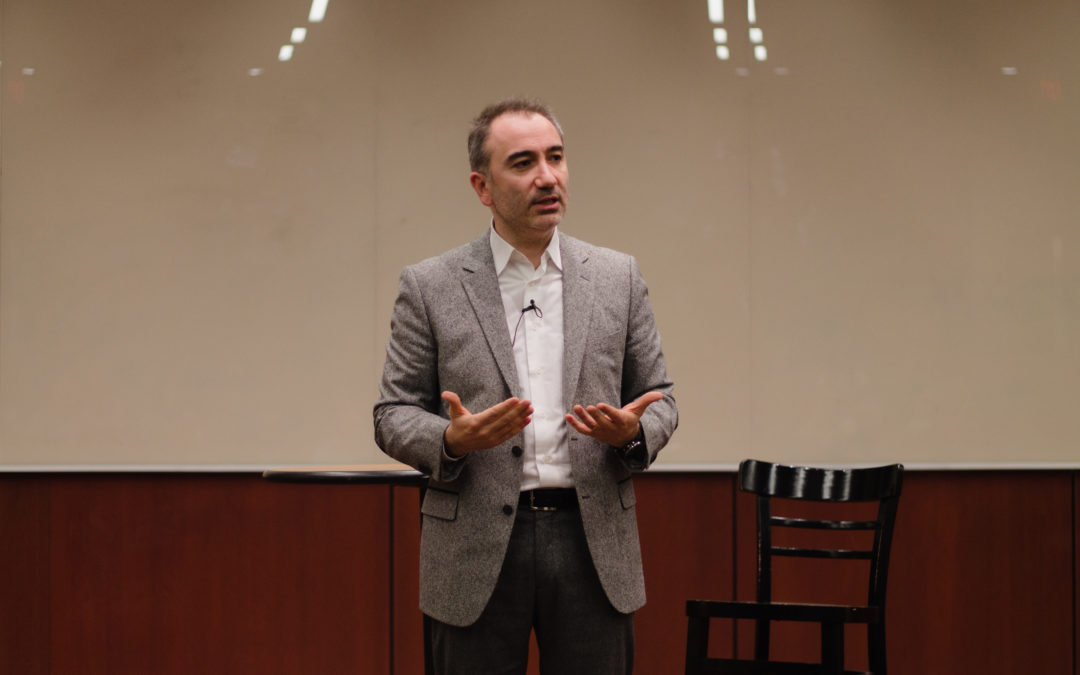Author and journalist Mustafa Akyol visited Lipscomb Thursday night and spoke on his book “Islam Without Extremes: A Muslim case for liberty” at 7:00 p.m. in Stowe Hall.
Akyol is a Turkey native who has visited the U.S. on many occasions. On one of his first trips to the States, he experienced McDonald’s pancakes for the first time. He recalled his affinity for the breakfast food and how he mistakenly thought pancakes were exclusive to McDonald’s.
“Years later, I took a lesson from that story,” Akyol said. “Foreign culture might be a little confusing when you meet it for the first time. If you misunderstand the cuisine, it’s not that difficult.
“But when you are confused about the values, religions and customs of another culture, there might be a larger gap to fill.”
Akyol attributes this misunderstanding of cultures to the media’s portrayal of different societies. Especially since 9/11, he says many people have made inaccurate assumptions about Islam based off of the actions of the terrorists.
“The fanatics attract our attention more than the normal people trying to go about their lives,” he said. “Islam was there for 14 centuries, with good and bad parts, but terrorism was never mentioned until the past 30 years.”
The extremists that cause fear in America are very few, and they are threats to everyone “that isn’t them,” Akyol said.
Akyol said the term “jihad,” to Muslims is like the word “crusade,” to Christians; its original definition had nothing to do with killing innocent people, he said, but the extremists redefined it, turning it into a terrorist doctrine in the minds of Americans.
According to Akyol, many violent acts of the extremists break traditional Islamic rules of war.
Akyol said he once hypothesized that in Turkey, most people had inaccurate opinions on Christianity, also, based off of radical Christians.
After a few Google searches, he found a top-news piece about a pastor from Florida who wanted to burn a Quran, which proved his hypothesis correct.
“We’re in a vicious cycle where we see disturbing things on one side and make judgments on the other side,” Akyol said. “That is why we should talk and have dialogue and have conversations.”
Akyol described Islam in relation to Judaism and Christianity, highlighting their similarities instead of their differences in order to promote common ground between the religions.
All three are based on the same Abrahamic origins. They emerged in the midst of polytheistic pagan cultures as radical religions because they worshiped a single God.
A deeper understanding of the culture is incumbent on Westerners in redeeming the relationship between American and Islamic cultures.
The issues within the different sects of the Islamic religion, Akyol says, is an internal Muslim issue.
“We are in a rough place in Islamic history,” he said. “We have terrorists and fanatics, but our roots are ground in tolerance, diversity and freedom.”
Akyol related this to other cultures’ rough patches throughout history and said he hopes that through a deeper understanding of one another, the hostility will subside.
“Instead of being enemies, let’s focus on the commonalities,” he said.
Akyol’s book, “Islam Without Extremes: A Muslim case for liberty,” can be purchased on Amazon. His upcoming book, “The Islamic Jesus: How the King of the Jews became a prophet of the Muslims,” can be preordered and will be released Feb. 14.

